- Home
- Environment
- Impactful Research
Impactful Research
To address the pressing challenges facing our planet and society, it is crucial to develop an understanding of the natural and built environment.
At the School for the Environment, our research spans a wide range of disciplines, reflecting the intricate interplay between human interactions and the environment. Through our mission of co-generating knowledge, we strive to provide the insight to tackle these issues and pave the way for a sustainable and equitable future.
Climate Change
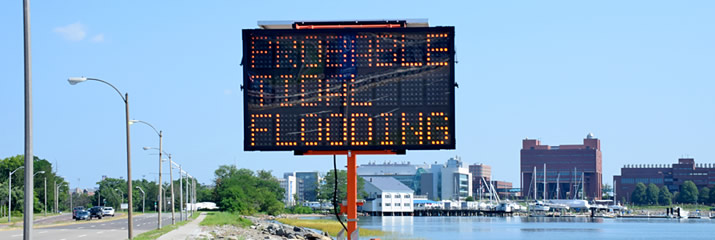
>Climate Change research at the School for the Environment crosses disciplines, geographies, and time scales. We are internationally known for our work on sea-level rise and climate change impacts on coastal cities. Our research advances new adaptation strategies that directly address issues of social and environmental justice and provides the foundational scientific knowledge from disciplines as far ranging as paleoenvironmental research to remote sensing of marine and terrestrial ecosystems.
Faculty Conducting Research in Climate Change:
- Mark Borrelli: Coast and shoreline evolution and sea-level rise impacts on sediment transport
- Michael Brookfield: Paleoclimates of the Paleozoic and Mesozoic
- Jarrett Byrnes: Kelp forest ecosystem responses to climate change
- Bob Chen: Climate change impacts on carbon cycling in coastal wetlands
- Ellen Douglas: Sea-level modelling of impacts on coastal physical infrastructure
- Lorena Estrada-Martínez: Climate change and mental health resilience
- Paul Kirshen: Climate change adaptation and engineering solutions for a green planet
- Zhongping Lee: Remote sensing of climate change impacts on ocean ecosystems
- Helen Poynton: Climate change impacts on gene regulation in coastal marine invertebrates
- Ken Reardon: Climate change planning and building equitable and just community responses
- William Robinson: Climate change impacts on toxicity of metals to marine invertebrates
- Crystal Schaaf: Climate change and forest biomass response
- Jianwei Wei: Ocean color and carbon cycle changes due to climate change
- Doug Woodhams: Shifting patterns of amphibian disease under warming/precipitation changes
- J. Cedric Woods: Native knowledge and the building of resilient communities
Environmental Studies & Sustainability
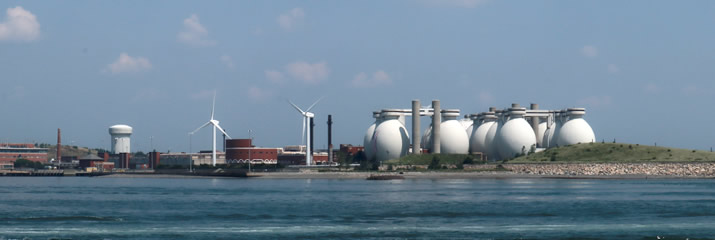
Environmental studies and sustainability research at the School for the Environment crosses a breadth of disciplines encompassing food systems, energy, business responses, economics, climate adaptation, restoration ecology, and sustainable development. We are recognized leaders in the integration of foundational science research with policy and management approaches leading to the development and implementation of practices that support the sustainable use of our natural resources and prosperity within our human community.
Faculty Conducting Research in Environmental Studies & Sustainability:
- Jennifer Bender: Sustainable seafood production and marine resource use
- Jarrett Byrnes: Marine ecosystem sustainability and ocean farming
- Beth Kaplin: Pastoral farming and sustainable practices, biodiversity sustainability
- Paul Kirshen: Green infrastructure and sustainable climate adaptation
- John Mandelman: Sustainable fisheries and resilient marine ecosystems
- José Martínez-Reyes: Forest conservation and sustainable resource management
- Georgia Mavrommati: Coupled socio-ecological systems modelling and sustainable development
- Antonio Raciti: Sustainable design, food systems and sustainable development
- Peter Schneider: Environmental management and sustainable systems interactions
- Maureen Scully: Organization behavior and grass roots employee initiated sustainability actions
- David Timmons: Alternative energy economics, food and energy supply chain sustainability
- Michael Tlusty: Food system solutions, food security and sustainability
- Alan Wiig: Sustainable development, smart city governance and community impacts
- J. Cedric Woods: Sustainable human-natural system impacts and indigenous knowledge
Coastal & Marine Science
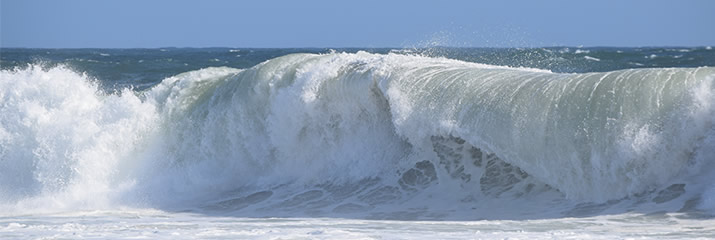
Located right on the shores of Boston Harbor the School for the Environment has a long tradition of coastal and marine research connecting the fields of oceanography and marine biology with marine policy, management and law. Our work supported the cleanup Boston Harbor, the first in the national Ocean Law, and the first Coastal Zone Management plan.
Faculty Conducting Research in Coastal & Marine Science:
- Michael Armstrong: Marine Fisheries Ecology, Life History and Natal Homing
- Jennifer Bender: Marine Protected Areas, marine debris policy and management
- Mark Borrelli: Coastal sediment transport and shoreline evolution
- Robert Bowen: Oceans and human health, emerging contaminants and human health risks
- Robert Brock: International fisheries governance, marine protected area policy and implementation
- Jarrett Byrnes: Marine biodiversity and ecosystem function, salt marsh ecosystem function
- Bob Chen: Ocean sensing networks, urban estuary dynamics, marine carbon chemistry
- John Duff: Ocean and coastal law, marine mammal legal protections, legal frameworks of ocean zoning
- Eugene Gallagher: Benthic ecology, mathematical modeling of benthic ecosystem dynamics
- Robyn Hannigan: Ocean acidification and biomineralization impacts in internal and external calcifiers
- Scott Kraus: Right whale ecology and conservation, impacts of humans on cetaceans
- Tim Lam: Tuna and sailfish population dynamics, satellite tag-physical oceanographic modeling
- ZhongPing Lee: Satellite remote sensing of ocean color dynamics and water quality
- Molly Lutcavage: Tuna and turtle population dynamics and life histories
- John Mandelman: Physiologic ecology of fishes, fish mortality and conservation
- Helen C. Poynton: Emerging contaminant impacts on gene regulation in marine invertebrates
- William E. Robinson: Marine toxicology and biochemical mechanisms of response
- David Terkla: Fisheries economics, marine protected areas
- Michael Tlusty: Aquarium trade impacts on marine ecosystems
- Juanita Urban-Rich: Micro/Nano-plastic impacts on early life stages of marine plankton
- Jianwei Wei: Marine water quality sensors and integration with remote sensing technologies
- Roberta L. Wollons: The integrated history of women and the whaling industry
- Stephanie Wood-LaFond: Seal population biology, seal ecology and conservation
- Lap-Fai (Craig) Yu: Visualization technologies and augmented reality
Ecology, Contaminants, & Conservation
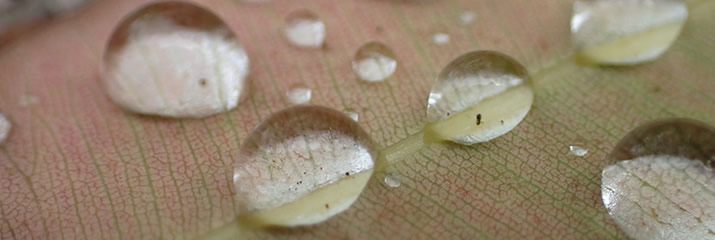
Our work in ecology, contaminants, and conservation crosses ecosystems and geographies. Following the biological continuum from transcriptomic to landscape ecology research done by our faculty centers on the conservation of biodiversity and the restoration of essential terrestrial and marine habitats.
Faculty Conducting Research in Ecology, Contaminants, & Conservation:
- Michael Armstrong: Fisheries ecology and fisheries conservation
- Robert Brock: Fisheries ecology and life history of commercial fishes
- Jarrett Byrnes: Marine biodiversity and kelp ecosystem biodiversity and marine conservation
- Eugene Gallagher: Benthic ecology, mathematical modeling of benthic ecosystem dynamics
- Beth Kaplin: Tropical forest ecology, primate ecology, biodiversity conservation
- Scott Kraus: Right whale ecology and conservation
- Tim Lam: Large pelagic fishes population population ecology, fisheries ecology
- Molly Lutcavage: Tuna and turtle population dynamics and fisheries ecology
- John Mandelman: Physiologic ecology of fishes, fish conservation
- Georgia Mavrommati: Ecosystem services valuation, human-ecosystem interactions
- Helen C. Poynton: Ecotoxicology, genomics and transcriptomics of marine and aquatic invertebrates
- Antonio Raciti: Ecosystem conservation, ecological design and biodiversity conservation
- Juanita Urban-Rich: Zooplankton ecology, plankton community dynamics
- Doug Woodhams: Disease ecology, fungal disease ecology and amphibian population biology
- Stephanie Wood-LaFond: Seal population biology, seal ecology and conservation
- Douglas Zook: Global ecology, biodiversity and ecological sustainability
Urban Planning & Community Development
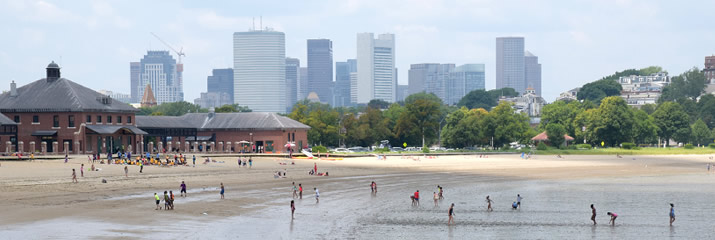
Our work in urban planning and community development focuses on addressing critical issues facing urban communities and ecosystems. With the City of Boston as our laboratory and our global research programs, our work provides actionable data and support for communities addressing complex issues of climate change adaptation, sustainable development, income inequality, housing inequity, environmental impacts on community health, and social/environmental justice issues.
Faculty Conducting Research in Urban Planning & Community Development:
- Adenrele Awotona: Sustainable urban development, community planning and disaster response
- Bob Chen: Urban watersheds and human impacts
- Amy Den Ouden: Colonization and indigenous rights, community history
- Ellen Douglas: Socio-hydrology, storm water management
- Lorena Estrada-Martínez: Community mental health, urban public health disparities
- Richard Hung: Microeconomics, immigrant community economic development
- Georgia Mavrommati: Urban coastal ecosystem services valuation
- Travis McCready: Economic development, entrepreneurship in urban settings
- Antonio Raciti: Ecological design, community planning, food insecurity
- Ken Reardon: Neighborhood and community planning, participatory environmental planning
- C. Eduardo Siqueira: Immigrant health, urban public health disparities, environmental justice
- David Timmons: Urbanization, rural-urban migration, and environmental change
- Jack Wiggin: Coastal planning, community planning, maritime economic development
- Alan Wiig: Smart city development, economic development and spatial planning
- J. Cedric Woods: Tribal economic development
- Zong-Guo Xia: Spatial analysis and demography
Please also visit our Urban Harbors Institute for more research on this topic.
Policy & Management
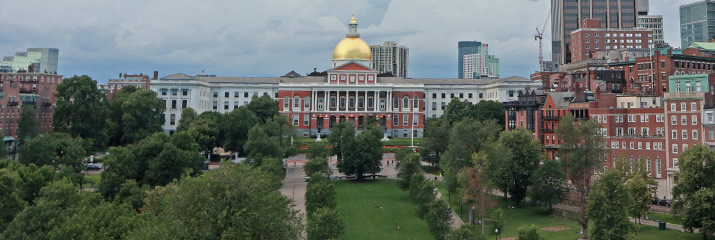
Research in policy and management integrates across disciplines to provide an understanding of how environmental policy influences decision making and how these decisions impact how humans interact with the environment. As recognized leaders in supporting and advancing policies that conserve and protect natural resources while addressing issues of social and environmental justice, our research transcends traditional social science boundaries
Faculty Conducting Research in Policy & Management:
- Robert Bowen: Policy analysis, decision indicators
- John Duff: Legal framework analysis, coastal and marine law and policy
- Richard Hung: Comparative microfinance policy analysis, Asian American nonprofit governance
- Beth Kaplin: Environmental advocacy, biodiversity policy analysis
- Georgia Mavrommati: Participatory decision making, modelling of socio-ecological dynamics
- Antonio Raciti: Food systems and inner city food insecurity
- Kenneth Reardon: Equity planning and social policy formulation
- C. Eduardo Siqueira: Immigrant health and safety, environmental justice and health policy
- Jack Wiggin: Municipal planning and maritime economic policy
- Alan G. Wiig: Global comparative governance and smart city economic development
- Amy Den Ouden: Feminist theory, indigenous women and political activism
- Jose E. Martínez-Reyes: Political ecology, human-natural system interactions and policy impacts
- Peter Schneider: Environmental regulation and sustainability policy implementation
- Maureen Scully: Organization change, diversity in the work place, work place rights
- David Terkla: Local economic development and coastal policy analysis
- David Timmons: Sustainability economics and renewable energy policy impacts
- J. Cedric Woods: Tribal governance, local economic empowerment and policy impacts
Seal Research
Have you seen a seal in Boston Harbor?
We want to know about it!
Your observations will improve our understanding of species, numbers, behavior, and important life history events that may be happening in Boston waters. Please upload your observations and photos in the form below.
Safe Seal Viewing Guidelines: Always stay 150ft (45m) away from seals. Moving towards the water, lifting their heads up (head alert), barking and yawning are signs that seals are stressed. If you see these behaviors please depart the area slowly.
Dead or Distressed Marine Mammals: If you encounter a dead or distressed marine mammal please contact the New England Aquarium's Marine Rescue Hotline: 617.973.5247.
Project Background and Goals
This project will address a major data gap in the distribution and natural history of harbor (Phoca vitulina concolor) and gray (Halichoerus grypus atlantica) seals in New England’s busiest harbor. Archaeological records demonstrate that both species were historically distributed along the northeast United States (U.S.) coast. This immediate goals of this project are to describe the spatial and temporal use of the Boston Harbor Islands by both species seals along with generating minimum local population numbers for each species and collecting important life history information. Sightings will also be incorporated into the Marine Animal Identification Network database.
The Principal Investigator for this project is professor Stephanie Wood, UMass Boston/School for the Environment. Stephanie has extensive seal research experience including aerial surveying and image processing, live animal captures and sampling, food habits and observational work. In addition to collecting public sightings data via this page, Stephanie will be conducting monthly boat-based seal surveys of the Boston Harbor Islands. These surveys will start in July 2019 and run through May 2021.
This work is made possible by a generous grant from the Massachusetts Environmental Trust and is being conducted in collaboration with the National Park Service Boston Harbor Islands. All survey work will be conducted under the NMFS/NEFSC (Woods Hole, MA) research permit # 21719.
For more information on the common species and/or groups working on seal research:
- NOAA - Harbor Seal Information
- NOAA - Gray Seal Information
- The Northwest Atlantic Seal Research Consortium
- Atlantic Marine Conservation Society
- Center for Coastal Studies - Seal Research
- NOAA - Northeast Fisheries Science Center - Seal Research
- UMass Boston - Marine Operations

Have you seen a seal in Boston Harbor?
We want to know about it!
Your observations will improve our understanding of species, numbers, behavior, and important life history events that may be happening in Boston waters. Please upload your observations and photos in the form below.
Safe Seal Viewing Guidelines: Always stay 150ft (45m) away from seals. Moving towards the water, lifting their heads up (head alert), barking and yawning are signs that seals are stressed. If you see these behaviors please depart the area slowly.
Dead or Distressed Marine Mammals: If you encounter a dead or distressed marine mammal please contact the New England Aquarium's Contact NOAA’s National Enforcement Hotline at: (800) 853-1964